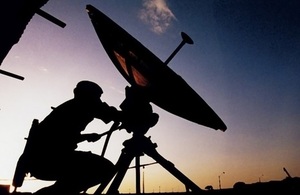Three...two…one…blast off! Dstl launches £50 million Space Programme
As the 60th anniversary of the launch of Sputnik1, the first satellite in space, is marked across the world, Dstl is joining in with World Space Week with its own astronomic news.

The Science Programme at the Defence Science and Technology Laboratory (Dstl) is set for a rocket boost of cash having recently begun a new 5 year £50 million programme of innovation.
The money will help to fund projects like the Daedalus experiment which is exploring the effect on satellites of so-called “de-orbit sails”. When deployed, the sail increases drag, causing a controlled descent into the Earth’s atmosphere where the satellite will burn up. Dstl is leading co-ordination of the UK element of Daedalus, tasking sensors to collect data to support this experiment. Of particular relevance to the military community is the effect that such high-drag satellites have on current Space Situational Awareness (SSA) sensors and processing.
The funding will also support experiments to look at the science of the ionosphere; Dstl is collaborating with the US on CIRCE (Coordinated Ionospheric Research Cubesat Experiment), which is a small satellite mission due to launch in 2019, which will improve our understanding of how satellite communications are impacted by disturbances in the ionosphere during periods of heightened solar activity. Working with US scientists, the Dstl space team are also partnering with UK companies to keep Britain at the cutting edge of space science for defence.
Recruitment for new members of the space team is underway to support the growing programme. Dstl has recently launched its annual graduate recruitment activity, and the Cyber and Information Systems Division is looking for graduate scientists and engineers to support the future Dstl Space Programme, on topics such as spacecraft design and operations, earth observation and space situational awareness. We are also looking for mid-career scientists, including a Spacecraft and Space Operations Engineer or Scientist and a Military Satellite Communications Engineer or Scientist to support our work on spacecraft design and military satellite communications.
Michael O’Callaghan, the lead for space at Dstl, said:
This programme is fantastic news for Dstl and for the UK as a whole. It allows us to invest in research and innovation that supports Defence and Security aspirations, as well as supporting UK prosperity and developing skills in government and the space industry. We are expanding our team with new roles for senior scientists, and graduate roles, to bring in the best talent. This cash will reinvigorate our work.
Dstl media enquiries
Email DstlPress@dstl.gov.uk
Press office 01980 950000 option 2
Updates to this page
-
Added links to 2 space job vacancies.
-
First published.